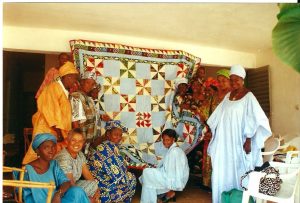Among the most impressive and inspiring women I’ve ever met were the Muslim women I worked with and befriended in Mali, when I lived in that far-off, West African country — after my Peace Corps service in Gabon — from late-1998 to early-2001. The dignity, strength, and endurance of my Malian women friends left me in awe. They were role models for me, and I find I’m remembering them especially now.
One of them in particular has been in my thoughts a lot lately: Ami Sylla, a tall, commanding woman, then in her mid-forties, was the head instructor at the women’s center, Benkady, where I taught crafts and, ultimately, patchwork quilting, at the women’s request. (See my Mali memoir, HOW TO MAKE AN AFRICAN QUILT: The Story of the Patchwork Project of Segou, Mali, published by Nighthawk Press, 2013.)

Whenever things would go wrong – such as the time my house in Segou, too, was robbed — Ami would look me in the eyes and say, firmly, “Il faut supporter,” which I interpreted as: One must endure.
Ami’s French was similar to mine. It was French-as-a-second-language-and-only-in-present-verb-tense French. So we communicated. I knew what she was saying, not only by her words but also by her deeds. She didn’t let anything undermine her. Even when faced with a life-threatening illness, she got right back up. She was the most indomitable woman I’ve ever known.
I found her quiet, solid faith — and that of the other women as well — admirable too. It inspired me to read the tattered copy of the Penguin Classic paperback of the Koran (English translation, by N. J. Dawood) I’d brought with me from New York but had never read. I began reading portions of the Koran every morning, at first merely out of intellectual curiosity about Islam, Mali’s predominant religion. But I soon grew to appreciate the beauty of its lyrical language, its lilting cadences, so much like David’s Psalms in the King James Old Testament. I found comfort and inspiration in its words.
This past week, following my recent break-in and robbery (see previous post), needing comfort and inspiration from any readily available source, I picked up my yellowed-and-worn Penguin paperback of the Koran and leafed through it to re-read my many underlined passages. One in particular spoke to me: “We shall test your steadfastness with fear and famine, with loss of life and property and crops. Give good news to those who endure with fortitude, who in adversity say, ‘We belong to Allah [the Arabic word for God], and to Him we shall return.’ On such men [and women] will be Allah’s [God’s] blessing and mercy; such men [and women] are rightly guided” (2:156).
The admonition to “endure with fortitude” is repeated throughout the Koran, and my Malian women friends clearly heeded and followed it. They had no smiley-face Western delusions or expectations about life being happy every day or even being within their human control. They lived at the mercy of drought, malaria-bearing mosquitoes, ineffectual local and national governments, and untold other threats that most of us have never had to endure. They understood, it seemed to me, from first-hand life experience, the need for endurance; and with that understanding, I observed, came empathy (rather than blame-the-victim judgment) for their fellows enduring the same.
So Ami’s words, in her voice, have been ringing in my ears as I’ve been picking myself up and moving on from this recent unsettling robbery: “Il faut supporter” — one must endure. As the Koran says, in so many words: Life is a test; do your best. I plan to take a lesson from Ami and friends and do just that.
